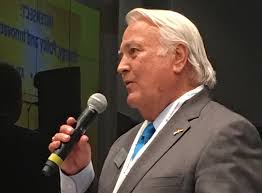

ATLANTA – Georgia’s two U.S. Senate runoff races are grabbing a huge amount of attention, both inside the Peach State and around the nation.
But a third runoff also will be contested on Jan. 5 to decide a seat on the state’s utility regulating Public Service Commission (PSC).
Incumbent Republican Lauren “Bubba” McDonald captured 49.7% of the vote in the November general election, barely falling short of the 50%-plus-one margin he would have needed to avoid a runoff.
Now, McDonald must go another round with Democratic challenger Daniel Blackman, who won nearly 47% of the vote in November.
McDonald, who served 20 years in the Georgia House of Representatives before joining the PSC in 1998, is taking a “If it ain’t broke, don’t fix it” approach to his reelection bid.
“We continue to have the most reliable energy sources of any state in the nation,” he said.
That dependability is what keeps companies knocking at Georgia’s door, McDonald said, pointing to Georgia’s ranking by Site Selection magazine as the No.-1 state in which to do business eight years running.
“If a business comes to Georgia, foreign or domestic, one of the first questions they ask is, ‘What are my energy sources?’ and ‘What’s the reliability of it?’ ” he said.
But Blackman said that strong business climate hasn’t spread throughout Georgia. He said he’s running for the PSC to help people in the less prosperous parts of the state through lower utility bills and expanded broadband connectivity.
“We like to say Georgia is the No.-1 state in which to do business,” Blackman said. “But a lot of counties outside metro Atlanta haven’t had a chance to recover because they were already struggling.”
McDonald has gained a reputation on the PSC as a champion of solar energy. He led a move in 2013 requiring Georgia Power to add 525 megawatts of solar power during the next 20 years, more than tripling the amount the company had voluntarily pledged to add through its Advanced Solar Initiative.
“They had no solar in their mix,” McDonald said. “Now, we’re sixth in the nation in solar deployment with no upward pressure on rates and no state subsidies.”
But Blackman said Georgia’s progress on solar isn’t coming quickly enough. The share of the state’s energy generating portfolio derived from renewable sources remains in the single digits, according to the U.S. Energy Information Administration.
That’s “crumbs off the table,” Blackman said, and is a result of “overinvestment in the fossil fuel industry and underinvestment in the renewable energy space.”
Blackman has made the issue of electric service disconnections a cornerstone of his campaign. The PSC suspended service disconnections last March, citing the impact of the coronavirus pandemic on customers’ pocketbooks, but voted in July to let Georgia Power resume the disconnections.
Since then, about 107,000 households have had their power shut off, while an additional 381,279 have received disconnection notices on their bills, according to numbers compiled by Georgia Power.
Blackman said the PSC ended the moratorium on disconnections too soon.
“I felt the long-term impact [of the pandemic] would be much longer than six to eight months,” he said.
But McDonald said Georgia Power and other utilities offer payment assistant programs to help customers having trouble paying their bills.
“There is no free electricity,” he said. “Somebody’s going to be paying for it.”
Along with the development of solar energy, McDonald cites the Plant Vogtle nuclear expansion project as an example of “clean, reliable and affordable” power he is helping to bring online.
He concedes the project has proven “costly to get off the ground,” with a series of cost overruns and scheduling delays that have nearly doubled the budget from the $14 billion estimate when the PSC approved the work in 2009.
But McDonald said the first new nuclear capacity in the U.S. in 37 years will more than pay for itself in the long run.
Blackman said the commission should have imposed a cap on the Vogtle expansion’s costs to protect Georgia Power customers footing the bill on a project he said eventually could run up to $35 billion over budget.
“We should have stopped charging ratepayers a long time ago,” he said. “The shareholders don’t have any skin in the game.”
Expanding broadband connectivity into unserved portions of rural Georgia is another of Blackman’s campaign priorities.
He criticized the PSC’s recent vote encouraging electric membership cooperatives (EMCs) to run broadband to their customers because commissioners rejected a proposal to let the PSC change the rates EMCs charge telecom providers for utility pole attachments after two years if they prove a disincentive to expanding broadband.
“We need to be able to have checks and balances in place,” Blackman said. “I’d like to see the PSC much more aggressive in pushing the EMCs.”
McDonald dismissed assertions from telecom providers that they might take their investments to other states with more favorable pole attachment rates. He said Georgia is too good an investment for them to pass up.
“Georgia’s got too much going on for them not to come,” he said.
Blackman also criticized the commission’s decision to let Georgia Power recover from ratepayers $525 million in coal ash cleanup costs.
The utility is working on a multi-year plan to close all 29 of its coal ash ponds at 11 power plants to meet federal regulations for handling coal ash, which contains toxic chemicals that can pollute drinking water supplies.\
“Georgia Power has done a great job employing people and keeping the lights on,” Blackman said. “But when it comes to the coal ash problem, we’ve got to take a more serious approach to protect the health and safety of all Georgians.”
The Sierra Club recently took Georgia Power to court in a thus-far unsuccessful effort to force the utility to pay for the cleanup rather than pass on the costs to customers.
But McDonald said it’s those customers who have reaped the benefit of inexpensive power generated by coal-fired plants.
“Coal ash was the residue of generating energy over many years,” he said. “The ratepayers are the people who enjoy the energy that comes from the coal.”
McDonald won his current term on the PSC by defeating Blackman in 2014 by almost a dozen points, 53.4% to 41.8%.
But the race figures to be closer this time. Democrats have gained strength in Georgia during the last six years, as shown by Stacey Abrams’ narrow loss to GOP Gov. Brian Kemp in 2018 and President-elect Joe Biden’s razor-thin win over President Donald Trump last month.
With the two Senate runoff races polling essentially even, Blackman also stands to benefit from being on the same ballot as Democratic Senate challengers Jon Ossoff and Raphael Warnock
On the other hand, wins for incumbent Republican Sens. David Perdue and Kelly Loeffler likely would translate into another six-year term for McDonald.
“